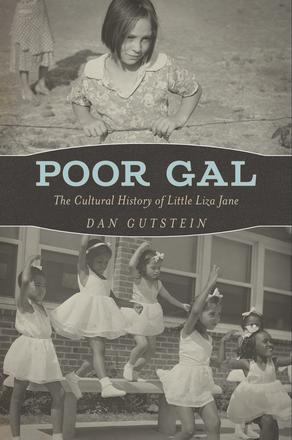
Poor Gal
The Cultural History of Little Liza Jane
The telling journey of a centuries-old tune and what it says about race, class, and American folk music
Description
Poor Gal: The Cultural History of Little Liza Jane chronicles the origins and evolution of a folk tune beloved by millions worldwide. Dan Gutstein delves into the trajectory of the “Liza Jane” family of songs, including the most popular variant “Li’l Liza Jane.” Likely originating among enslaved people on southern plantations, the songs are still performed and recorded centuries later.
Evidence for these tunes as part of the repertoire of enslaved people comes from the Works Progress Administration ex-slave narratives that detail a range of lyrics and performance rituals related to “Liza Jane.” Civil War soldiers and minstrel troupes eventually adopted certain variants, including “Goodbye Liza Jane.” This version of the song prospered in the racist environment of burnt cork minstrelsy. Other familiar variants, such as “Little Liza Jane,” likely remained fixed in folk tradition until early twentieth-century sheet music popularized the melody.
New genres and a slate of stellar performers broadly adopted these folk songs, bringing the tunes to far-reaching listeners. In 1960, to an audience of more than thirty million viewers, Harry Belafonte performed “Little Liza Jane” on CBS. The song was featured on such popular radio shows as Fibber McGee & Molly; films such as Coquette; and a Mickey Mouse animation. Hundreds of recognizable performers—including Fats Domino, Bing Crosby, Nina Simone, Mississippi John Hurt, and Pete Seeger—embraced the “Liza Jane” family. David Bowie even released “Liza Jane” as his first single. Gutstein documents these famous renditions, as well as lesser-known characters integral to the song’s history. Drawing upon a host of cultural insights from experts—including Eileen Southern, Carl Sandburg, Thomas Talley, LeRoi Jones/Amiri Baraka, Charles Wolfe, Langston Hughes, and Alan Lomax—Gutstein charts the cross-cultural implications of a voyage unlike any other in the history of American folk music.
Reviews
"An insightful and informative study that traces the cultural history of the ‘Liza Jane’ family of songs."
- Lauren Eldridge Stewart, assistant professor of ethnomusicology at Washington University in St. Louis
"Dan Gutstein should be praised not just for his scholarship but his detective work. His meticulous documentation of ‘Liza Jane’ song lyrics and dance games is a model for the type of research that underscores the importance of African American culture. His cross-cultural findings linking minstrel troupes to works of fiction provides evidence of the fluidity of ideas not just within American folklore but American society. The many versions of Liza Jane exemplify the complexity one encounters when examining the making of America."
- E. Ethelbert Miller, 2023 Grammy nominee and author of If God Invented Baseball
"A tour de force of sleuthing, historical study, innovative listening, and all-trails follow-up into the present, Dan Gutstein's Poor Gal traces a key DNA strand of American music. Gutstein's findings ricochet widely and open far-reaching dimensions of an understudied classic hiding in plain sight."
- Eric Lott, author of Black Mirror: The Cultural Contradictions of American Racism
"I would not, at first glance, have thought that a cultural history about one folk song would be interesting, engaging, and often thought-provoking, but Poor Gal is all of these things. Who knew that ‘Little Liza Jane’ was the glue holding the universe together, at least since the first date-stamped reference appeared in a Louisville newspaper in 1864, picked up steam throughout the various regiments in the Civil War, and emerged postbellum as an enduring part of the entertainment world?"
- Tracy Carr, The Clarion-Ledger